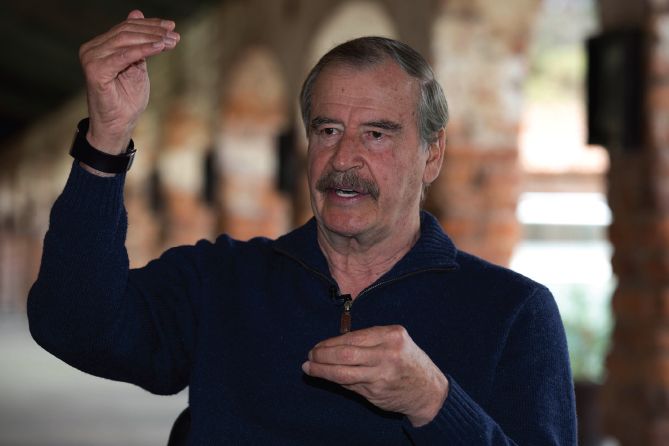Five Questions with Vicente Fox, Former President of Mexico
by John Schroyer
Vicente Fox served as commander-in-chief of Mexico from 2000 to 2006, but now the 74-year-old ex-president is spending some of his golden years stumping on the international stage for marijuana legalization in both his home country and elsewhere.
During a news conference with the media – including Marijuana Business Magazine – before a National Cannabis Industry Association conference in June, Fox hailed Mexico’s recent moves to legalize medical marijuana at the national level. However, he said there are many more reforms that should be enacted globally, such as inserting cannabis into international trade agreements.
Following are his answers to some of the questions asked during the news conference, edited for length and clarity.
What’s your stance on cannabis legalization?
I’ve been around this issue for a long time, with the idea of promoting legalization, not only for one so-called “drug,” cannabis, but for all drugs. That’s my position. I think it’s not the right of governments to intervene in citizens’ personal behavior or personal beliefs. I don’t think prohibition has worked, and we have paid a huge price for that. We’re paying the price of losing our youth, by the tens of thousands, hundreds of thousands.
I think the cannabis industry … is a great big responsibility for all participants, whether it be farmers, processors, traders and promoters of this newly born industry. It’s a sensible industry. It’s an industry that requires ethical behavior. It’s an industry that requires responsibility from all its participants so that it grows and flourishes.
It’s an industry that should not be dealt with by the attorney general’s office. It should now be in the hands of health authorities, because in the end, it has to do with public health. The proof is that all those that took this step forward (already), like Holland, like Portugal, they are doing extremely well. They did eradicate crime. They did eradicate the underground economy. They did bring in regulations that have brought in income and taxes to governments.
It was recently revealed that U.S. Attorney General Jeff Sessions may want to prosecute marijuana businesses. What do you think about that?
That he is crazy. That he doesn’t know about history. That he doesn’t know what we have built with such a big effort.
Humankind is moving along, taking decisions to build a better world. I don’t know what happens with the Trump administration, but they’re totally blind. And it’s not fair that a guy which only has (roughly 38%) support of people determines and imposes either executive orders or other ways and means upon people. We’re going to stand firm against what’s going on, because it’s not only the fate of the United States, it’s the fate of the whole world.
What would it mean for Mexico if the United States were to legalize marijuana? What’s the impact to Mexico?
We are partners, United States, Mexico and Canada – we are solid partners through NAFTA. Today, most Fortune 500 corporations are what I call NAFTA corporations. They nourish themselves with the competitiveness of each of the three nations and the three economies. You cannot separate that, because you will pay a huge price in cost. You will lose competitiveness. We will lose being the No. 1 region of economic power in the world.
All of this has to do with cannabis. Now, this newly born industry is already larger in jobs, larger in sales, than many other economic sectors and many other industries. And it’s just the beginning. Cannabis legalization has the capacity to create jobs in Mexico, to stop the killings in Mexico.
Now we’re going to have farmers. Now we’re going to have processors. Now we’re going to prove the quality of cannabis in Mexico. Now we’re going to be an exporting economy, and that will be, and it should be, one of the areas to negotiate in NAFTA. This product should be included in NAFTA. No trade barriers, no taxes. That’s what we should do, and I’m sure that’s what we’re going to do.
Imagine the border between San Diego and Tijuana, where one side is already legalized and the other one does not, which would be Mexico. It would be crazy, that border. That’s the same conflict you have here in the states.
Are you speaking of the fact that the United States is between two nations that will now have federally legal cannabis, Canada and Mexico?
Right now we’re basically equal in regulation, the three nations … so now we’re on common ground to develop this industry. Unfortunately, in the United States, the federal law is still very restrictive. It criminalizes drugs. You have close to 3 million people in jail because they exercised their own free will and free responsibility. It’s incredible.
How do you see the international cannabis industry changing or evolving over the next few years?
Today’s situation of prohibition and criminalization has created international organizations, international cartels that don’t respect borders, don’t respect law, don’t respect nothing.
Look at the price we’re paying in Mexico. With (former Mexican President Felipe) Calderon’s administration, it went up to 160,000 kids killed in the streets. And the same thing is happening in Central America and of course in Colombia. They have to move from prohibition to legalization. Otherwise there will be this underground market where the only thing that it provokes is increased prices of the drug and crimes.
Today, fortunately, in Colorado, in Washington, now it’s in the hands of (state) government, through taxation, and it’s a totally different story. International situations, global situations will follow national decisions.





